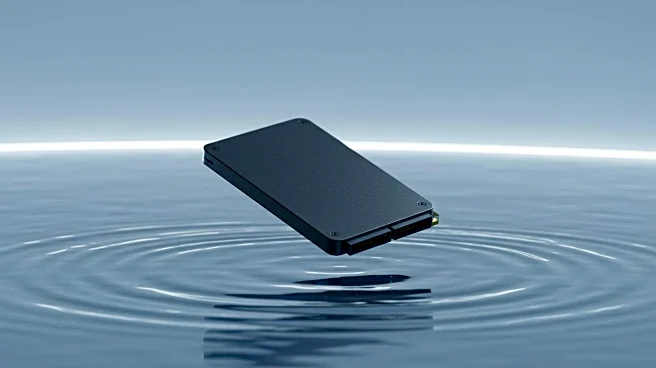What's Happening?
Biwin, a prominent player in the memory and storage industry, has unveiled a new type of SSD, termed the 'Mini SSD'. This innovative storage solution is significantly smaller than traditional SSDs, measuring just 15 x 17 x 1.4 mm, and offers capacities ranging from 512 GB to 2 TB. The Mini SSD boasts impressive read and write speeds of up to 3,700 MB/s and 3,400 MB/s, respectively, which surpass the performance of the fastest MicroSD cards currently available. Additionally, the Mini SSD is IP68-rated, ensuring it is dust-tight and can withstand immersion in water up to one meter deep. It also features internal shock-proofing, allowing it to survive drops from heights of up to three meters. However, the adoption of this new technology may face challenges, as it requires proprietary sockets in devices, limiting its immediate compatibility.
Why It's Important?
The introduction of Biwin's Mini SSD could significantly impact the mobile storage market by offering a faster and more durable alternative to existing MicroSD cards. This development is particularly relevant for gaming devices and other mobile technology that require high-speed data transfer and robust storage solutions. If widely adopted, the Mini SSD could lead to a shift in how manufacturers design and integrate storage components in their devices, potentially enhancing performance and user experience. However, the need for proprietary sockets means that widespread adoption will depend on device manufacturers' willingness to support this new format, which could influence the pace at which this technology becomes mainstream.
What's Next?
For the Mini SSD to gain traction, device manufacturers must begin integrating the necessary proprietary sockets into their products. Currently, only a few devices, such as the Strix Halo-powered GPD Win 5 and the upcoming OneXPlayer SuperX, are reported to support the Mini SSD. As Biwin is a major manufacturer, it may have the influence needed to encourage broader adoption. The success of this technology will depend on its acceptance by major manufacturers and consumers, which could take time given the established dominance of MicroSD cards in the market.
Beyond the Headlines
The introduction of the Mini SSD raises questions about the future of mobile storage solutions and the potential for innovation in this space. As technology continues to evolve, the demand for faster, more reliable, and compact storage solutions will likely increase. The Mini SSD represents a step towards meeting these demands, but its success will depend on overcoming the challenges associated with introducing a new format into a competitive market. The broader implications could include shifts in manufacturing standards and consumer expectations regarding mobile device performance and durability.








